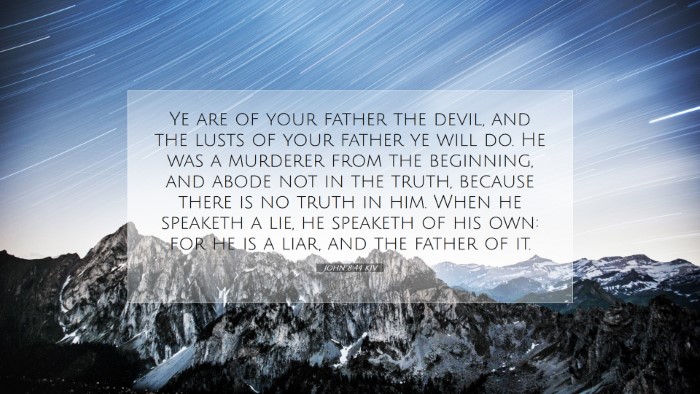Commentary on John 8:44
Verse: "You are of your father the devil, and the desires of your father you want to do. He was a murderer from the beginning, and does not stand in the truth, because there is no truth in him. When he speaks a lie, he speaks from his own resources, for he is a liar and the father of it."
Introduction
This verse carries profound implications regarding the nature of truth, deception, and the spiritual heritage of humanity. In examining this verse, we can draw insights from various public domain commentaries to unravel its depths and implications for understanding the nature of Christ's adversaries as well as the broader theological implications regarding sin and truth.
The Fatherhood of the Devil
Matthew Henry offers insightful commentary on the concept of spiritual parentage, indicating that by aligning their beliefs and actions with the devil, the Jews of Jesus' time reveal their true father. This assertion stands as a stark contrast to the notion of being children of God, demonstrating that allegiance to sin and unbelief associates one with the devil.
The Nature of the Devil
Albert Barnes highlights the critical attributes of Satan described by Jesus. The devil is characterized as a "murderer" and a "liar," which emphasizes the moral bankruptcy and the destructive nature of sin. Barnes points out that the devil's role as a murderer from the beginning refers to the spiritual death ushered in by sin, symbolizing a break in fellowship with God.
Parental Influence
Adam Clarke suggests that the term "father" in this context denotes influence and authority. Just as children often emulate their parents, those who engage in lies and murder show their alignment with their devilish parentage. Clarke emphasizes that Jesus aimed to illustrate that the motivations and actions of the Jewish leaders were rooted in a rebellious spirit against God.
Truth and Deception
The statement that "there is no truth in him" underscores theologically rich ground. Matthew Henry elaborates that this assertion reflects the belief that all truth is associated with God, and to lie is to venture away from God's nature. This places the active hostility of the devil directly against the divine character, providing believers with a clear standard against which to measure truth.
The Devil as Father of Lies
Albert Barnes articulates that, by identifying Satan as the "father of lies," Jesus is emphasizing that all falsehood ultimately originates with him. Lies lead to moral decay and separation from divine truth, affirming the necessity for believers to remain grounded in the teachings of Christ, who embodies truth. Barnes implores readers to see the urgency of adhering to truth in their own lives, warning against the subtle ways in which lies can infiltrate.
Theological Implications
Adam Clarke remarks on the broader implications of this passage regarding the struggle between good and evil. Clarke presents the idea that humanity is presented with a choice: to follow the way of truth, represented by Christ, or the way of lies and death, represented by Satan. This dichotomy calls for a thoughtful understanding of one’s spiritual position.
Moral Responsibility
The assertion that those who follow lies are ultimately aligned with the devil necessitates an examination of moral responsibility. Matthew Henry encourages rigorous self-examination of one’s own life choices and thoughts. He posits that a sincere pursuit of truth leads to fellowship with God and a distancing from evil.
Application for Believers
In reflecting on the implications of John 8:44, believers, pastors, and theologians must grapple with several practical applications:
- Discernment: Encouraging a foundation built on the truth of Scripture to discern between the lies of the world and God’s truth.
- Moral Integrity: Emphasizing integrity in speech and action, recognizing the weight of words as reflections of one’s spiritual life.
- Introspection: A call for personal and corporate introspection, challenging communities to examine their values and teachings against the standard of Christ.
Conclusion
John 8:44 serves as a sobering reminder of the spiritual reality of deceit, spiritual parentage, and moral consequences. By understanding the nature of our adversary and the danger of aligning with his actions, we are called to embrace the truth of Christ, which liberates and provides life. The insights gleaned from the commentaries of Matthew Henry, Albert Barnes, and Adam Clarke enrich our comprehension and equip us for a life grounded in the truth.


